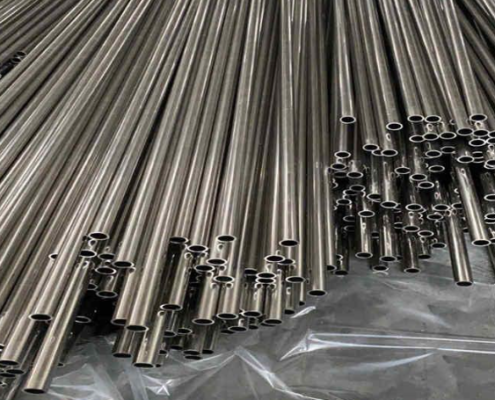Mechanical properties and strength characteristics of C71500 alloy
C71500 is a copper-nickel alloy, also known as copper-nickel 70/30 alloy. It consists mainly of 70% copper (Cu) and 30% nickel (Ni) with small amounts of iron (Fe) and manganese (Mn). C71500 has good corrosion resistance and mechanical properties and is suitable for a wide range of industrial applications.
The following are some of the characteristics and applications of C71500 alloy:
Corrosion resistance: C71500 alloy has excellent corrosion resistance, especially to seawater and saltwater environments. Therefore, it is commonly used in marine engineering, seawater cooling systems, ship components, etc.
Mechanical properties: C71500 alloy has good strength and toughness, and can maintain stable mechanical properties over a wide range of temperatures. It has good impact toughness and plasticity and is suitable for the manufacture of pipelines, valves, pump bodies, and other components requiring strength and reliability.
Welding properties: C71500 alloy has good weldability and can be joined and fabricated by common welding methods (such as gas-shielded welding, arc welding, etc.).
Thermal conductivity: C71500 alloy has high thermal conductivity and can be used in applications requiring high thermal conductivity, such as heat exchangers, radiators, etc.
C71500, also known as copper-nickel 70/30 alloy, has the following physical and chemical properties:

Physical properties:
Density: approximately 8.94 g/cm3.
Melting Point: Approximately 1170°C (2140°F).
Coefficient of Thermal Expansion: The linear coefficient of thermal expansion is approximately 13.2 x 10^-6/°C at room temperature.
Thermal conductivity: The thermal conductivity is approximately 30.7 W/(m-K) at room temperature.
Electrical conductivity: The electrical conductivity is approximately 7.6 MS/m at room temperature.
Chemical properties:
Main composition: C71500 alloy consists mainly of 70% copper (Cu) and 30% nickel (Ni), with small amounts of iron (Fe) and manganese (Mn).
Corrosion resistance: C71500 has good corrosion resistance to corrosive media such as seawater, salt water, and acidic and alkaline solutions.
Strength: C71500 alloy has good strength and toughness and can maintain stable mechanical properties over a wide range of temperatures.
Magnetism: C71500 alloy is non-magnetic at room temperature.
C71500 alloy has a wide range of applications in many fields, common applications include
Marine engineering: With its excellent corrosion resistance and resistance to seawater erosion, C71500 alloy is commonly used in the manufacture of marine engineering equipment and components, such as seawater coolers, saltwater pipes, ship components, etc.
Chemical industry: Due to its good corrosion resistance, C71500 alloy is suitable for chemical process equipment, distillers, furnace tubes, heat exchangers and catalyst carriers, etc.
Power industry: C71500 alloy is used to manufacture components such as coolers, condensers, and heat exchangers for electric power generation equipment to provide efficient heat transfer and corrosion resistance.
Food processing: C71500 alloy meets sanitary standards and can be used in food processing equipment and containers, such as food cans, pipes, and parts that come into contact with food.
Special Requirements:
Corrosion resistance: C71500 alloy should have good corrosion resistance, especially to corrosive media such as seawater, salt water, and acidic and alkaline solutions.
Mechanical properties: C71500 alloy needs to have certain strength, toughness, and plasticity to meet the requirements of specific applications.
Weldability: C71500 alloy needs to have good weldability for reliable welded connections during fabrication and installation.
Heat Treatment and Aging: Depending on the requirements of a specific application, C71500 alloy can be heat treated and aged to improve its properties and corrosion resistance.
Quality Control: Strict quality control, including material testing, process monitoring, and product inspection, is required during the production and manufacture of C71500 alloy to ensure the quality and consistency of the alloy.
In summary, C71500 alloy has a wide range of applications in offshore engineering, chemical, power, and food processing, where special requirements such as corrosion resistance, mechanical properties, welding properties, heat treatment requirements, and quality control need to be met. These requirements are key factors in ensuring the excellent performance and reliability of C71500 alloy in specific environments.


